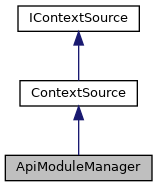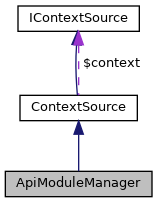This class holds a list of modules and handles instantiation. More...


Public Member Functions | |
| __construct (ApiBase $parentModule) | |
| Construct new module manager. More... | |
| addModule ( $name, $group, $class) | |
| Add or overwrite a module in this ApiMain instance. More... | |
| addModules (array $modules, $group) | |
| Add a list of modules to the manager. More... | |
| getGroups () | |
| Get a list of groups this manager contains. More... | |
| getModule ( $moduleName, $group=null, $ignoreCache=false) | |
| Get module instance by name, or instantiate it if it does not exist. More... | |
| getModuleGroup ( $moduleName) | |
| Returns the group name for the given module. More... | |
| getNames ( $group=null) | |
| Get an array of modules in a specific group or all if no group is set. More... | |
| getNamesWithClasses ( $group=null) | |
| Create an array of (moduleName => moduleClass) for a specific group or for all. More... | |
| isDefined ( $moduleName, $group=null) | |
| Returns true if the specific module is defined at all or in a specific group. More... | |
 Public Member Functions inherited from ContextSource Public Member Functions inherited from ContextSource | |
| canUseWikiPage () | |
| Check whether a WikiPage object can be get with getWikiPage(). More... | |
| exportSession () | |
| Export the resolved user IP, HTTP headers, user ID, and session ID. More... | |
| getConfig () | |
| Get the Config object. More... | |
| getContext () | |
| Get the RequestContext object. More... | |
| getLang () | |
| Get the Language object. More... | |
| getLanguage () | |
| Get the Language object. More... | |
| getOutput () | |
| Get the OutputPage object. More... | |
| getRequest () | |
| Get the WebRequest object. More... | |
| getSkin () | |
| Get the Skin object. More... | |
| getTitle () | |
| Get the Title object. More... | |
| getUser () | |
| Get the User object. More... | |
| getWikiPage () | |
| Get the WikiPage object. More... | |
| msg () | |
| Get a Message object with context set Parameters are the same as wfMessage() More... | |
| setContext (IContextSource $context) | |
| Set the IContextSource object. More... | |
Private Attributes | |
| $mGroups = array() | |
| $mInstances = array() | |
| $mModules = array() | |
| $mParent | |
Detailed Description
This class holds a list of modules and handles instantiation.
- Since
- 1.21
Definition at line 34 of file ApiModuleManager.php.
Constructor & Destructor Documentation
◆ __construct()
| ApiModuleManager::__construct | ( | ApiBase | $parentModule | ) |
Construct new module manager.
- Parameters
-
ApiBase $parentModule Parent module instance will be used during instantiation
Definition at line 45 of file ApiModuleManager.php.
Member Function Documentation
◆ addModule()
| ApiModuleManager::addModule | ( | $name, | |
| $group, | |||
| $class | |||
| ) |
Add or overwrite a module in this ApiMain instance.
Intended for use by extending classes who wish to add their own modules to their lexicon or override the behavior of inherent ones.
- Parameters
-
string $group Name of the module group string $name The identifier for this module. string $class The class where this module is implemented.
Definition at line 69 of file ApiModuleManager.php.
References $name, and array().
Referenced by addModules().
◆ addModules()
| ApiModuleManager::addModules | ( | array | $modules, |
| $group | |||
| ) |
Add a list of modules to the manager.
- Parameters
-
array $modules A map of ModuleName => ModuleClass string $group Which group modules belong to (action,format,...)
Definition at line 54 of file ApiModuleManager.php.
References $name, addModule(), and as.
◆ getGroups()
| ApiModuleManager::getGroups | ( | ) |
Get a list of groups this manager contains.
- Returns
- array
Definition at line 171 of file ApiModuleManager.php.
◆ getModule()
| ApiModuleManager::getModule | ( | $moduleName, | |
$group = null, |
|||
$ignoreCache = false |
|||
| ) |
Get module instance by name, or instantiate it if it does not exist.
- Parameters
-
string $moduleName module name string $group optionally validate that the module is in a specific group bool $ignoreCache if true, force-creates a new instance and does not cache it
- Returns
- mixed the new module instance, or null if failed
Definition at line 81 of file ApiModuleManager.php.
◆ getModuleGroup()
| ApiModuleManager::getModuleGroup | ( | $moduleName | ) |
Returns the group name for the given module.
- Parameters
-
string $moduleName
- Returns
- string group name or null if missing
Definition at line 159 of file ApiModuleManager.php.
◆ getNames()
| ApiModuleManager::getNames | ( | $group = null | ) |
Get an array of modules in a specific group or all if no group is set.
- Parameters
-
string $group optional group filter
- Returns
- array list of module names
Definition at line 110 of file ApiModuleManager.php.
◆ getNamesWithClasses()
| ApiModuleManager::getNamesWithClasses | ( | $group = null | ) |
Create an array of (moduleName => moduleClass) for a specific group or for all.
- Parameters
-
string $group name of the group to get or null for all
- Returns
- array name=>class map
Definition at line 129 of file ApiModuleManager.php.
◆ isDefined()
| ApiModuleManager::isDefined | ( | $moduleName, | |
$group = null |
|||
| ) |
Returns true if the specific module is defined at all or in a specific group.
- Parameters
-
string $moduleName module name string $group group name to check against, or null to check all groups,
- Returns
- boolean true if defined
Definition at line 146 of file ApiModuleManager.php.
Member Data Documentation
◆ $mGroups
|
private |
Definition at line 38 of file ApiModuleManager.php.
◆ $mInstances
|
private |
Definition at line 37 of file ApiModuleManager.php.
◆ $mModules
|
private |
Definition at line 39 of file ApiModuleManager.php.
◆ $mParent
|
private |
Definition at line 36 of file ApiModuleManager.php.
The documentation for this class was generated from the following file:
- includes/api/ApiModuleManager.php
